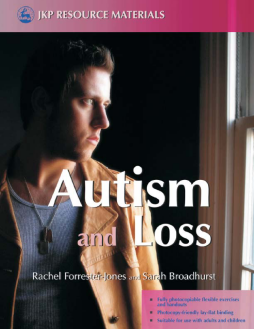
Additional Information
Book Details
Abstract
People with autism often experience difficulty in understanding and expressing their emotions and react to losses in different ways or in ways that carers do not understand. In order to provide effective support, carers need to have the understanding, the skills and appropriate resources to work through these emotional reactions with them. Autism and Loss is a complete resource that covers a variety of kinds of loss, including bereavement, loss of friends or staff, loss of home or possessions and loss of health.
Rooted in the latest research on loss and autism, yet written in an accessible style, the resource includes a wealth of factsheets and practical tools that provide formal and informal carers with authoritative, tried and tested guidance.
This is an essential resource for professional and informal carers working with people with autism who are coping with any kind of loss.
This is an accessible and useful book for those working with people with autistic spectrum disorder... I was impressed with the practical approach taken within the book... I would recommend this book as a great starting point for addressing the difficult topic of loss with people with autism. The book addresses some of the generic issues associated with loss and in addition contemplates how the experience of autism may in itself create or intensify areas of loss, as the person with autism not only has to adjust to the loss, but also to the differences between themselves and others.
Rowan Crawley, Scotish Journal of Healthcare Chaplaincy
the book has a valuable point to make in highlighting the problems people with autism encounter in expressing feelings after loss.
The British Journal of Developmental Disabilities
Rachel Forrester-Jones is Senior Lecturer in Community Care at the Tizard Centre, University of Kent, UK, where she also engages in service consultancy. She researches issues related to loss, as well as social networks and social support of different client groups including students with disabilities, and she has been Master of Rutherford College, University of Kent since 2002. Sarah Broadhurst is Lecturer in Learning Disabilities at the Tizard Centre and has worked in the learning disability field as a support worker in a residential service for adults. She has a special interest in working with people who have Asperger's Syndrome and helps run a support group for them.
Autism and Loss opens the professional's eye to a topic rarely discussed in professional literature, and for that reason alone it is turned to time and time again.
Families in Society
This book is rare in the subject that it approaches and it is also excellent in offering us a model for how to deal with loss in a more reflective, constructive, thoughtful and ultimately more effective way. It is written primarily for professionals and is highly recommended to them, but I think that parents would also find it useful in dealing with this delicate and often difficult subject.
GAP
This book is a collection of information, practical exercises and worksheets offering guidance to carers and professionals supporting people on the autistic spectrum who are suffering from loss. This is a valuable resource, since due to the difficulties experienced by those on the autistic spectrum, in terms of linking cause and effect, and understanding and expressing their emotions, this can be a particularly frightening experience.
A Great strength of the book is the breadth of losses explored; losses of social relationships, home and possessions, role and identity, health and wellbeing, and loss through death. Consideration of these losses could be thought-provoking enough with a neuro-typical individual, but the range would be particularly useful when working with individuals on the autistic spectrum, where difficulties in perception may lead to wider confusion.
Another strength of the book is the clarity and repetition of its format, which promotes a sense that a relevant section can be found and dipped into, and used immediately, without having to become accustomed to the content of the whole book. The regular use of headings also makes the content very clear to read and absorb.
I feel that it would be very useful for any adults working closely with other children and adults, as it forms a comprehensive background to loss and the autistic spectrum, which could be valuable to any professional.
Counselling Children and Young People
Table of Contents
| Section Title | Page | Action | Price |
|---|---|---|---|
| List of Acronyms i-v | |||
| Preface v | |||
| I WOMEN AND THE TRANSPORT OF WATER | |||
| A Background 1 | |||
| B Why Improve Water Supplies? 3 | |||
| C Transport and Development 5 | |||
| D The Division of Labour 6 | |||
| E The Consequences of Having to Carry Water 9 | |||
| 1 Health effects 9 | |||
| 2 Economic effects 10 | |||
| 3 Social effects 12 | |||
| F Alternative Technologies 13 | |||
| 1 Carrying aids 14 | |||
| 2 Wheelbarrows and handcarts 17 | |||
| 3 Animal transport 18 | |||
| 4 Others 19 | |||
| 5 Introducing new technologies 21 | |||
| II KENYA: THE PROBLEMS AND SOME SOLUTIONS | |||
| A Water Supply in Kenya 23 | |||
| B The Workload 25 | |||
| C Carrying Methods 28 | |||
| D Case Studies in Kenya 32 | |||
| 1 Kamajene Farmers' Centre 32 | |||
| 2 Action Aid - Kibwezi Region 34 | |||
| 3 Utooni Development Project 36 | |||
| 4 Discussion 39 | |||
| E Donkeys in Development 42 | |||
| III CONCLUSIONS | |||
| A General Conclusions 44 | |||
| B Conclusions on Kenya 44 |
